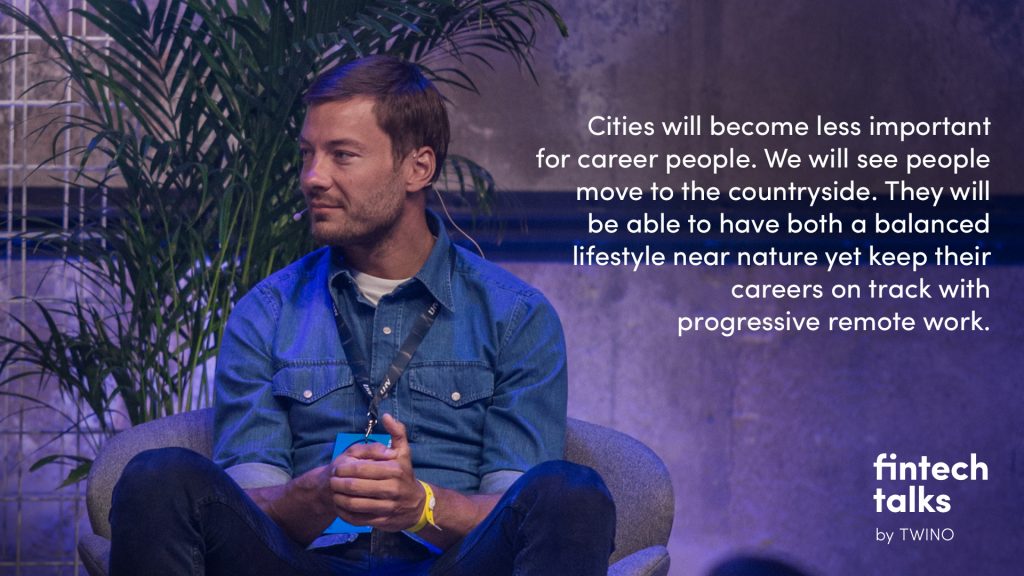Since the start of the Covid-19 crisis, “remote work” has become a buzzword – some have fallen in love with it, while others can’t wait for things to get back to what they used to be. And this goes for both workers and employers.
But the seeds of change have been planted, and already large companies like Twitter have announced that they will permanently be working remotely, or at least until their employees want to return to the office. TWINO is also in the process of shifting to a hybrid office that entails employees working remotely for at least half of the week.
The shift to decentralized offices, digitalization, and remote work is affecting numerous industries, and many experts are discussing the social and economic implications of this trend. But we at TWINO see the distributed workforce as something more – as a solution to major challenges like reducing geographical inequality, improving the mental health of people across the world, and finally, protecting the environment.
Can remote and decentralized work really help tackle these seemingly unrelated problems the world has been facing for years? We think it could, and here’s how.
Reducing geographical inequality through distributed employment opportunities
First, we have to remember that remote work does not necessarily mean working from home. In fact, we are moving towards a paradigm where it’s nobody’s business where you do your work from.
Techcrunch introduces the term “Work From Anywhere” as opposed to “Work From Home,” saying that “It’s not about further imprisoning us in our homes — it’s about empowering us to think and work exactly where we are personally most productive.”
Sure, many will stick to working from home and many others will use the opportunity to return to the office as soon as it’s safe. But somewhere in between people will start understanding the true meaning of flexibility and seeing what working from anywhere really offers. It may be a cafe, a co-working space, but it may also be your summer house, the park, or your friend’s garden.
If people are allowed to work remotely long-term, they no longer need to commute to the office and physically attend business meetings. It’s likely that with time, many people will choose to move out of the city to greener, calmer areas with a lower cost of living.
When a distributed workforce becomes the new normal, the hiring processes will also change and become more accessible to foreign candidates and locals from other regions of the country. This approach should also be welcomed by companies as it would give them a wider talent pool to source employees from.
Decentralizing hiring and working can be one of the long-needed solutions for re-invigorating the countryside and the smaller towns that have been experiencing a major brain-drain.
I’ve already shared my vision at one of TWINO’s Fintech talks:

Hopefully, the shift to decentralized and remote work will breathe new life into peripheries and open up new business opportunities for small-town dwellers. Cesis in Latvia is a good example of how a small town has seen several co-working spaces spring up after a Riga-based tech company Draugiem Group opened its Cesis branch in 2017.
A new quality of life that comes with the “Work From Anywhere” model
While many freelancers and knowledge workers around the world have already been doing “Work From Anywhere” long before the Covid-19 crisis, even the most progressive businesses are only now seeing this as a win-win situation for everyone involved. For example, Shopify recently declared itself a “digital by default company” announcing that “office centricity is over” and that their employees will be able to permanently work remotely.
For companies, going remote does not necessarily mean saving money. Yes, there may be reduced office utility costs or real estate savings, but new expenses are likely to appear with time (like travel costs, remote workplace setup costs, etc.). Nonetheless, moving to the decentralized working model is an investment in the well-being, productivity, and ultimately, profitability, of employees.
Thanks to powerful internet connectivity in remote areas, there are not many reasons for employers to keep their knowledge workers in the city. With time, individuals will feel empowered to think and work exactly where they personally feel most productive.
Not to mention the health benefits that come from living in less polluted areas, working from smaller towns or the countryside has massive mental health and work-life benefits. Studies show that there are lower rates of mood and anxiety disorders and schizophrenia in non-urban areas than in cities.
Workers themselves report feeling happy with flexible and remote work opportunities. TWINO’s survey that was carried out one month after moving all the staff to remote work due to the Covid-19 crisis, concluded that employees are satisfied with working from home and that they feel efficient while working remotely.
We asked Carl Honoré, an award-winning writer and the voice of the Slow Movement, how moving to a remote and decentralized work model can improve the well-being of people. He said: “I think all countries need to resist the tendency for all the jobs to congregate in one area – decentralizing is much better for the environment, for quality of life and often for productivity too.”
Honoré is convinced that “commuting makes it hard to be Slow. You waste so much time, it’s exhausting, and bad for the environment. Much better to have people living in a network of self-contained little communities complete with shops, workplaces, schools, and homes.”
A nod to the environment
The environment is another winner from the present shift to the remote work model. The benefits here seem obvious – less commuting means less traffic and less air pollution. We can already see a positive impact in countries like China, where lockdowns and other measures have resulted in a 25% reduction in carbon emissions.
Even if there were to be new negative implications like the carbon footprint of a greater sent email volume, the overall impact from distributed working will still be a net positive one.
Also, starting a greener lifestyle could be easier while living in the countryside – if not growing your own veggies, then at least buying locally produced food and starting a compost bin in your backyard. Not to mention less frequent shopping and fewer takeaway coffees from the nearby cafe.
The takeaway
In many places around the world, big cities have accumulated the lion’s share of the intellectual and cultural potential along with the brightest minds who have found employment in cities.
This new reality we’re dealing with is an opportunity to redesign employment as we know it and to shift from a city-centric working and hiring practice to a global one.
We at TWINO believe that if people were given absolute freedom of choice regarding their work environment, we would soon see a reduction in geographical inequality and an improved work-life balance for many knowledge workers. And it could open doors to a more nature-friendly lifestyle for those who find it difficult to live green in the city.
